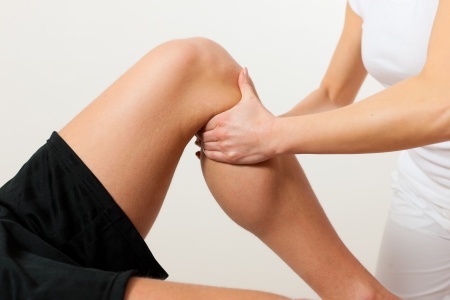Physical Therapy: How Often
You have been working out at the gym for weeks now and things have been going well. However, you lower back, legs, rhomboid muscles and a few other areas do not seem to be as supple as they should and constantly feel tight and fatigued. You have likely reached a point where your body needs some help in adjusting to the work load you have placed on it.
You’ve also been longing for one for a while now so, it’s time for that massage. Although your fatigue seems to have brought on this necessity, how often one should get a massage is a fairly common question. There is no clear answer, but I’ll attempt to put this in perspective.
There are multiple factors that contribute to the frequency of physical therapy/massage, which primarily include the persons size, training intensity, and training frequency.
Advertisement: New Balance (click on photo for more info)

Although massage is mostly used to keep you from injury and over training, it’s great for increasing the flow of nutrients to muscles, reducing tension and stress, increasing flexibility, enhancing nervous system functions, inducing sleep, and increasing appetite.
As a general rule of thumb, the average fitness buff should have a physical therapist check and massage them based on the therapists judgement at least once every 6-8 weeks; more if you’re a competitive athlete of any kind. Depending on your individual uniqueness, scheduled visits will vary. Think of it like a maintenance check for an oil change on your car. Just like that oil change for the car, your body needs to periodically get a massage. I recommend deep tissue types if you are a competitor in fitness and figure, body building, athletics and sports, etc.
Before seeking a massage, you should first try to combat over training. Some common methods to reduce over training include ceasing training for one week and when training always perform a light warm-up and stretching and, cut training time to 30 min/day max. Next, reduce protein intake to 15% of total calories; many fitness buffs use a lot more protein than they really should (pushed in large part by fad diets), pushing it up to 35% or more of daily caloric intake; 25% is generally sufficient as a max, but there are times when you should do more.
Another way to combat over training is to increase complex carbohydrates to 70% of total calories. Your brain actually runs on sugar and this will give you a boost. You can also increase antioxidants to 200% of the recommended dosage. Finally, get a minimum of 9-hours sleep for a few days. These basic techniques can help combat over training. But, the more you have trained, the more in need of a massage you will be. It’s interesting to note that many people will work out for years and never have a massage. If this is you, it’s definitely time to change that habit.
If you still find slow recovery from soreness and other exercise pains, it’s definitely time to visit your therapist.
There are two types of massage; local and full body. For high training loads, a full body massage is advisable (twice per week). These massages should not be deep, but relaxing with rubbing and kneading techniques. If training loads are light or medium, a massage once every two weeks is sufficient.
Local massage is used to treat special areas. An example of a local massage is when you may need extra attention to the hamstrings because of a particular activity that exerts constant work on a specific muscle such as the hamstrings or upper back. When speed-strength training, special attention should be given the lower back, glutes, and hamstrings. A massage should be given only by a qualified sports massage therapist. Times needed for the massage generally range from 5-10 minutes for a light local massage; 10-25 minutes for a medium local massage and 20-25 minutes for a hard local massage.
For most athletes, either a local or full massage should be obtained at least once every 3-4 weeks. The harder you train, the more frequent you will need them and the more you will need to go to a full-body massage. The time requirement for a full body massage usually considers the your body size/weight. Generally for those weighting 135 pounds or less time required is about 40 minutes, 136-150 lb person is 50 minutes; 151-200 lb person is 60 minutes and a person over 200 lb is 60+ minutes. Talk to your therapist or ask one of our experts.
To prevent injury and increase skills requires that proper care be taken with the body. A massage is yet another tool to help you maintain better health and well, they feel great. Go get one and you’ll see.






